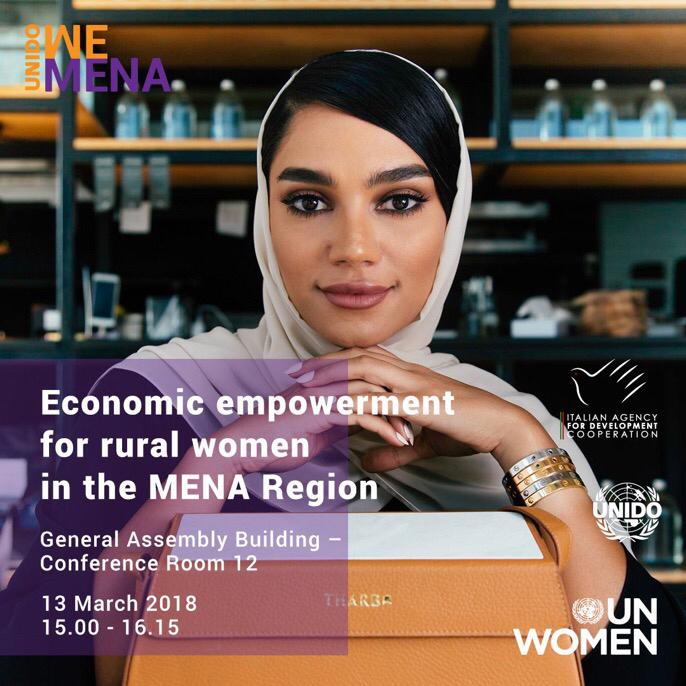NOTE: This post was written by Roxane Heidrich. Roxane is a United Nations Youth Representative at the Center for United Nations and Global Governance Studies (School of Diplomacy and International Relations, Seton Hall University). She is specializing in Global Negotiations, Conflict Management and International Security, with a research focus on international mediation, cross-cultural dialogue facilitation, and security issues.
In the frame of the 62nd Session of the Commission on the Status of Women, between March 12 and 23, a number of high-level and side events are being held at the United Nations Headquarters in New York City and at various locations in the area of the UN premises. Women’s participation in the worldwide economy and the challenges that rural women face in the least developed regions are two key concerns to the work of the United Nations. These issues were the focus of the high-level event on Tuesday, March 13, titled “Economic empowerment for rural women in the MENA region.”
Co-organized by the governments of Italy and Tunisia, this event hosted United Nations agencies (UNIDO, FAO, UN Women), civil society organizations (Afrilanthropy), and private sector firms (Hammoud Law Firm, Illy Foundation). With a view to spelling out best practices and opening perspectives to the enhancement of women’s participation in the local and global economy, panelists engaged in a conversation on the opportunities and challenges women face economically in the Middle East and North Africa region.
Data from 2016 reveals that in the MENA region the number of women present in the labor force is almost equal to the overall female working-age population (15-54), meaning that a large percentage of women in these countries is actively contributing to the economy. Yet, unpaid work, informal employment, reduced asset ownership, and limited access to services are preventing women from taking full advantage of their participation in the economic activities.
In her opening remarks, H.E. Teresa Bellanova, Deputy Minister of Economic Development of the Government of Italy, highlighted that female entrepreneurs in many developing countries supported by the Italian Government, such as Egypt, Tunisia, Jordan, Lebanon, Morocco, Palestine and Algeria, face difficulties like limited access to credit and markets, lack of training, and lack of networks. Such challenges are further compounded by the cultural component that prevents women, who wish to have their own business, to be taken seriously.
On a similar line, Fatou Haidara, Managing Director of Corporate Management and Operations at the United Nations Industrial Development Organization (UNIDO), added that the benefits of industrialization are not always equally distributed. Women are precluded from access to secure jobs, which is why the mandate of UNIDO is to promote inclusivity in industrialization. “Women’s empowerment should not be a goal, it should be common sense,” Haidara said. The logic is that by excluding or hindering women from the full participation in the production cycle deprives the world’s economy from half its potential.
Dr. Hania Hammoud from the Hammoud Law Firm in Lebanon and Elisabetta Illy from the Illy Foundation in Italy, both of whom represented the private sector, presented their perspective on how women from rural areas can be successfully empowered. Dr. Hammoud noted that the traditional role of women in the local economy must be recognized and respected. Rural women are guarantors of the socio-economic stability and peaceful life in Lebanon because they reflect the national cultural economy. They are resilient, determined, strong, passionate, and skillful custodians of Lebanon’s traditional heritage. As such, any intervention aimed at improving their work must be based on a knowledge of the local social fabric.
Ethiopia, on the other hand, is one of the biggest producers of coffee and supplies big coffee corporations such as Illy. According to Elisabetta Illy, the traceability of commodities, the selective investment strategies of large corporations, and the development of best practices is what can make the difference in the status and quality of life of women working in the coffee industry. Traceability is particularly important as it means that producer countries know what the final product looks like and they can take steps to improve the quality of the raw materials. This would allow women coming from the communities that work directly with those materials to have a chance of earning more. Not only would this improve women’s situation, Illy said, but it would give families the opportunity to send their children to school instead of sending them to work.
In conclusion, working to create inclusive and regulated participation of rural women in in the MENA economy and on a global scale means fulfilling women’s rights – as recognized by many of the participants. “Empowering women makes economic sense,” commented Emanuele Santi, Founder and President of Afrilanthropy, pointing to a future in which the cooperation between governmental and non-governmental organizations brings significant changes in how both the economy and rural women can benefit from more inclusive practices.
